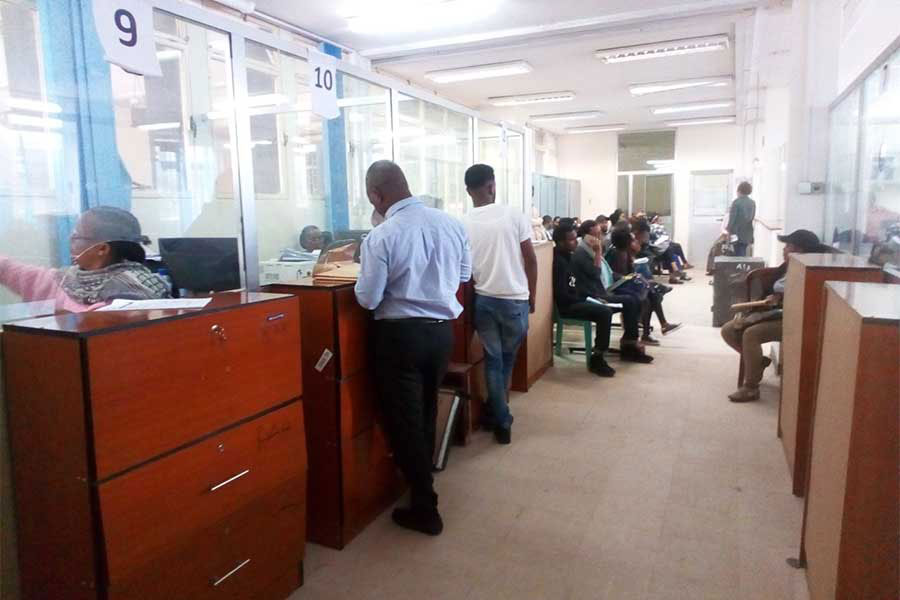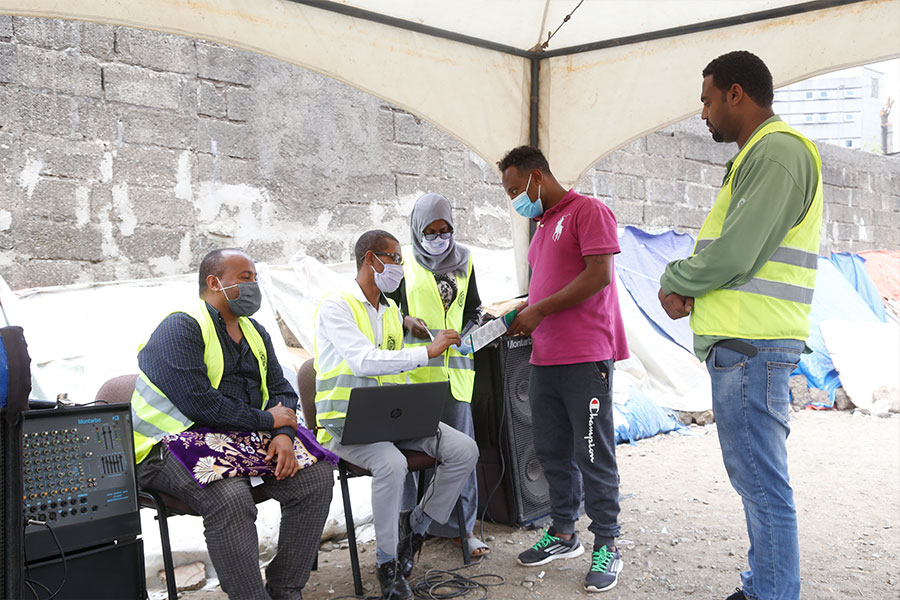
Radar |
The six-decade-old journey of Wallia Leather & Leather Products, one of the oldest leather establishments in the country, recently ended. Named after an endemic mountain goat, the company was known for exporting semi-processed hides and skins. Before its long journey came to an end, the company had been tested in getting access to finance and foreign currency for the past couple of years.
All the company's struggles bore no fruit and forced the company to close its doors a month and a half ago. Located near the Drivers & Mechanics Training Centre in Aqaqi Qality District, Walia had exhausted all its options to stay afloat. It had reduced its workforce from 500 to 200 and had seen its manufacturing capacity decrease significantly.
Struggling with financial strain, the firm pleaded with Commercial Bank of Ethiopia (CBE) to access finance, especially for a renewal of an overdraft facility limit and the restructuring of existing loans.
By March, it had requested support from the CBE to renew its existing overdraft facility and request a restructuring of its loans through a nine-month waiver. Two months later, the company got a promising response or at least what started off as one.
The Bank granted the company a renewal on its overdraft facilities for up to 20 million Br and an additional 30 million Br in a pre-shipment facility to procure raw materials that the leather company desperately needed.
This came with an additional 250,000 Br renewal of a performance guarantee. But the letter did not end there. The Bank's response, however, ended with a significant condition — the company had to first clear all its accrued interest, an instruction tantamount to sealing its unfavourable fate. The Bank stated that the company needed to do better on its loan repayment before accessing more.
It was devastating news for the managers of the company, which have been struggling for survival due to the impact of the Novel Coronavirus (COVID-19) and other factors, including a shortage of raw material and foreign currency. This pushed Wallia Leather & Leather Products, a pioneer in the industry, to close its doors last month after nearly 60 years.
"Things were beyond the capacity of the company," said Tatek Yirga, the president of the Ethiopian Leather Industry Association and general manager of Kangaroo Industrial Group.
Access to finance and foreign currency are not only the problems of Wallia but the hurdles of many industries in the country. But these issues appear to have greatly ravaged the leather and tannery business.
Three more companies are following in the footsteps of Wallia, according to Tatek, mentioning Addis Abeba Tannery, Batu Tannery and Ethio-Leather Industry Plc (ELICO), which already went out of business and are on the verge of giving up.
"Issues with access to finance and foreign currency are forcing companies to shut their doors," he said.
Against such a backdrop of uncertainty in the economy and the financial sector though, deposit mobilisation, and thereby profit, of most commercial and state banks has risen to a staggering height in the past fiscal year.
Outstanding loans, excluding corporate bonds, increased by 20.4pc to a little over one trillion Birr. Out of this total, the state banks — the CBE and the Development Bank of Ethiopia (DBE) — account for 66.4pc.
One of the major achievements of the financial sector is their investments in fixed assets such as skyscrapers in the Financial District, which is located close to Mexico Square.
The weighted average saving and time deposit rate of banks stood at eight percent. At the same time, the simple average lending interest rate increased to 14.25pc from 13.5pc. The lending rate last year went up as high as 21.5pc.
Out of the total loans and advances approved last year, the biggest private institution, Awash Bank, has a share of 5.5pc. Mines, power and water resources took the lion's share of the outstanding loans and advances, which is 29.5pc. Industry followed with a share of 21.5pc. The share of the private sector improved slightly to 47pc from 44pc.
This might have been due to the attention given to the private sector, as envisaged in the economic reforms, according to Abdulmenan Mohammed, a financial statement analyst with close to two decades of experience.
However, this did not translate into Wallia Tannery's case, since it did not stop the company from shutting its doors and letting go of its employees and the legacy it kept for over six decades.
Though the government set a priority of supporting businesses in the manufacturing and agro-processing sector to get loans, manufacturers are facing their biggest period of challenge, which has lasted for a couple of years. But the problem became more severe after the onset of the COVID-19 pandemic.
"Banks are treating manufacturing just like the service sector," said Tatek, "which needs to be rectified."
Though the banks have reported a positive performance, particularly in making market share gains, they operated through a year where the country was shaken by recurrent unrest and the deadly negative impact of the pandemic. The sector was also tested by different challenges, including a foreign exchange crunch and a tight liquidity environment, which had never been seen in the past two decades. To address the problem, the central bank intervened and availed 14.5 billion Br in loans to the private banks in two rounds at a competitive bidding interest rate.
The pandemic arrived in the country when the banks were pulling themselves out of a liquidity crisis. Borrowers were not able to service debts due to the storming effect of the virus, and mobilising resources was another challenge for the banks.
The deposits mobilised by banks increased by 15.8pc to just over one trillion Birr — about 10 billion Br more than total outstanding loans. The growth rate is lower than the rate that was recorded during the year ended in June 2019, when deposits grew by 23.2pc.
But everything was not a dead-end for the banking industry. As part of the Homegrown Economic Reform Plan, the central bank has made a few major policy changes to relax the banks' operational ground. It has repealed the mandatory NBE bond, which required commercial banks to surrender 27pc of their gross loans and advances in exchange for the bonds.
With a maturity period of five years and a five percent interest rate, the bonds were redirected to the DBE, which finances priority areas selected by the government. The banks were getting five percent interest for the bond while paying three percentage points more interest for the deposits they mobilise.
During the years, considerable progress was observed in branch expansion, which increased by 947 to 6,511. Out of the total branches, 66pc of them are located in the regional states.
Last year, the other major policy changes were the central bank's move in reforming the T-Bill market, making the market determine the yield rate. The move is aimed at attracting banks, insurance companies and individuals to participate in the primary market through auctions.
There is also an interesting development in the treasury bill market, according to Abdulmenan.
The share of treasury bills held by banks accounts for 23.6pc of the total of 23.7 billion Br. The outstanding treasury bills collapsed to 23.7 billion Br from 138 billion Br due to the conversion of treasury bills into three-year bonds during the market-based regime's introduction.
What is remarkable about the new system is that the average weighted yield significantly increased from 1.7pc to 4.8pc, according to Abdulmenan.
The 28-day bill commanded as high as 5.1pc, whereas the lowest yield was 4.3pc for the 91-day bill. Despite the improvement in the treasury bills market, the government still relied on the NBE advance for deficit financing. Gross advances to the central government increased by 18.3pc to 230.2 billion Br. Likewise, the claims from the DBE increased by 11.5pc to 58.1 billion Br.
Over the past fiscal year, the broad money supply increased by 17pc to 1.04 trillion Br.
"This was chiefly due to the 23.6pc increase in domestic credit," said Abdulmenan. "This drove inflation up."
Over the year, inflation constantly remained in the two-digit range, with an average rate of 19.9pc despite the government's target of keeping the rate in the single digits.
Banking sector growth means nothing if the growth rate is not higher than the inflation rate, according to Zafu Eyessuswork, board chairperson of Hibret Bank and a veteran in the financial sector.
"Except for the banks with solid capital," he said, "I didn't see substantial growth from other banks."
Borrowing from the NBE has been one of the main culprits for repeated bouts of inflation in the past decade, according to Abdulmenan.
"Unless this practice is eventually phased out," said Abdulmenan, "fighting inflation will be difficult."
Getachew Asfaw, a macroeconomist, says that the economy faces a severe foreign currency crunch and higher inflation and unemployment rates, which are simultaneously reflected in the financial sector.
"It's very difficult to have a healthy financial sector while the economy is unstable," he said.
The pandemic has also caused the plunge of the global economy and affected export-oriented businesses leading to a decline in foreign currency earnings. The government's policy to continuously depreciate the Birr's value against a basket of foreign currencies has also significantly undermined the income of the Bank from foreign currency dealings.
Even in a protected market, banks are facing a threat from the banks that are in the process of formation, according to Zafu.
Over a dozen banks are queued to join the financial sector. Thus far, ZamZam has officially joined the industry, while Ahadu, Goh, Hijira, Tsehay, Afro, Damota, Amhara and other new banks are in various levels of formation.
"To get clients, the new banks will be competing on price," he said. "And this is dangerous."
But these are not the only problems of the industry, according to Zafu, who pointed to Ethio telecom's engagement in the financial sector, lack of experienced and innovative leaders and workers, and the unavailability of research and training institutes as additional hurdles.
Zafu also mentioned the government's different requests toward the financial sector to contribute money for different projects as another financial stress.
Over the past two years, banks have contributed a substantial amount of money to Dine for Sheger, Dine for the Nation, the School Feeding Programme and a funding pool that was organised to support the government's efforts to offset the spread of the pandemic. Banks have also given money to the Prosperity Party.
"I see most of the contributions as corporate social responsibility," said Zafu. "But it was a strain."
Zafu also says that nothing has yet transformed the sector, which might face challenges when the financial sector is opened up.
"The supervisors are still operating with the previous old mindset," he said.
Zafu also recommended the emancipation of the National Bank of Ethiopia by making the institution report to the parliament, as it had been doing until 2008, a switch from the current structure of being accountable to the Prime Minister.
The country is also heading to open up the financial sector while the financial sector is struggling to remain dominant and successful locally, according to Zafu.
Ethiopia has reinstated the World Tourism Organisation (WTO) accession process and is a signatory of the recently launched African Continental Free Trade Area (AfCFTA), which aims to create a free and single continental market for goods and services.
PUBLISHED ON
Feb 06,2021 [ VOL
21 , NO
1084]

Radar |

Sponsored Contents | Jun 17,2021

Commentaries | May 15,2021

Editorial | Nov 01,2025

Commentaries | Nov 05,2022

Fortune News | Sep 19,2020

Fortune News | Dec 10,2022

Radar | Oct 20,2024

Agenda | Apr 17,2021

Fortune News | Jul 28,2024

Dec 22 , 2024 . By TIZITA SHEWAFERAW
Charged with transforming colossal state-owned enterprises into modern and competitiv...

Aug 18 , 2024 . By AKSAH ITALO
Although predictable Yonas Zerihun's job in the ride-hailing service is not immune to...

Jul 28 , 2024 . By TIZITA SHEWAFERAW
Unhabitual, perhaps too many, Samuel Gebreyohannes, 38, used to occasionally enjoy a couple of beers at breakfast. However, he recently swit...

Jul 13 , 2024 . By AKSAH ITALO
Investors who rely on tractors, trucks, and field vehicles for commuting, transporting commodities, and f...

Nov 1 , 2025
The National Bank of Ethiopia (NBE) issued a statement two weeks ago that appeared to...

Oct 25 , 2025
The regulatory machinery is on overdrive. In only two years, no fewer than 35 new pro...

Oct 18 , 2025
The political establishment, notably the ruling party and its top brass, has become p...

Oct 11 , 2025
Ladislas Farago, a roving Associated Press (AP) correspondent, arrived in Ethiopia in...